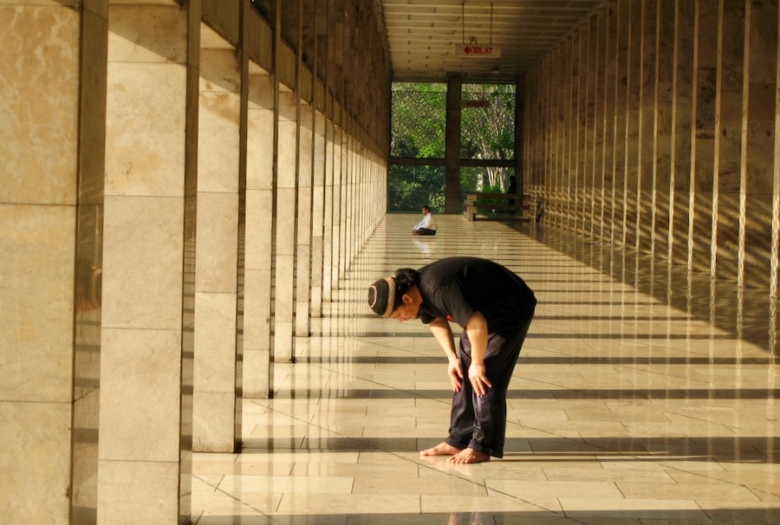Tips for Reporters: A once-in-a-lifetime story—virtual Passover, Easter and Ramadan

Each week, several IARJ journalists around the world talk briefly by Skype to discuss trends in reporting on religion and the best tips we can offer to our international membership. This week, our Skype conversation began with this:
We could not think of a major holiday season in our lifetimes in which Jews, Christians and Muslims all had to cancel big traditional gatherings in the same month.
Here in North Africa, there was discussion of whether we would cancel even the fasting during Ramadan, but what I am hearing now is that we will be fasting,
said Larbi Megari, our co-managing director based in Algeria.
Here in Italy, of course, Catholic churches will be closed at Easter,
said Elisa Di Bendetto, also a co-managing director.
And here in the United States,
I said, we’re seeing lots of announcements and online discussion about streaming Easter services—and about organizing virtual seders for Passover via Skype or Zoom or some form of social media.
None of us are old enough to personally remember either the Great Depression that swept the world in the ‘30s or the depths of World War II, but we know that major religious holidays were never cancelled across entire nations even in those global crises. During the Cold War, of course, some religious traditions were suppressed in some parts of the world—and varying patterns of religious oppression continue in some countries to this day.
But there is no question that this is an unprecedented month: Traditional gatherings have been cancelled for major observances in all three Abrahamic faiths on a global scale.
This crisis also comes at a time of unprecedented access to the Internet. So, never-before-seen gatherings are being planned from the most intimate virtual Seder
with a handful of relatives gathered around their digital screens as they move through the Haggadah—to worldwide connections like one planned by megachurch pastor Rick Warren. Even the world’s poorest communities may be streaming special services, because smartphones are widely owned even in some of the world’s most impoverished regions.
Religious experiences will unfold this month that no reporter has ever covered.
In other words,
I said in our weekly meeting, we ought to remind our members that they are going to be reporting on what we hope will be a once-in-a-lifetime religious experience: Major holidays in all three Abrahamic faiths transformed by social distancing.
Tell Us What You’re Reporting
If you are a religion journalist with a fresh perspective on this unprecedented story, email us with a link to your story. On this topic, our IARJ religion writers can email [email protected]
Some of the Holiday-Related Religion Stories We Have Seen
In The New York Times, Elizabeth Dias reported: The Apocalypse as an Unveiling
: What Religion Teaches Us About the End Times
In Religion News Service, Ellen Bernstein reported: The Seder’s secrets to enduring a pandemic
Gabe Friedman reported for Jewish Telegraphic Agency: Having a solo Passover seder? There are plenty of guides for you.
News from Bangladesh was reported by Irfan Nooruddin and Rudabeh Shahid and published both by the Atlantic Council and the Dhaka Tribune, Defusing Bangladesh’s COVID-19 time bomb The story covers many aspects of the public health crisis in Bangladesh, but includes the impact of religion at several points in the overall report.
Four journalists collaborated on this Jerusalem Post report: Netanyahu says public should celebrate Passover, Easter, Ramadan alone
From Malaysia, The Star reports: Malaysians say no to Ramadan bazaars, fearful of a potential third Covid-19 wave Also from FMT news in that part of the world: This year, fasting month minus Ramadan bazaars in Selangor
Elise Solé at Yahoo! Lifestyle chimed in with: As Easter, Passover and Ramadan near, religious leaders adapt holiday observances during the coronavirus pandemic
Mariam Nabbout on StepFeed: Ramadan is under quarantine this year, but how are Muslims prepping?
Diaa Hadid’s story carried by NPR in the U.S. connects a number of Muslim communities: Mass Religious Gathering In Pakistan Leads To Fresh Concerns Over COVID-19 Spread
In your reporting, do you need a quick data source on use of digital technology during the COVID-19 crisis? Pew Research on April 2 posted a useful overview, which reporters may want to cite as they cover the many ways people can stream religious resources. Shannon Schumacher and Nicholas Kent reported: 8 charts on internet use around the world as countries grapple with COVID-19
Care to Read More? Or to Share Your Reporting Links?
WIKIPEDIA has already developed an extensive page on Impact of the 2019-20 Coronavirus Pandemic on Religion.
As always, Wikipedia pages about a current crisis could contain flaws or could have missed the most current information—however, this Wikipedia page is, so far, the world’s best overall index of news developments on this topic. Wikipedia’s key to inclusion of information is notability,
meaning that each detail and sentence has to be footnoted. If you check the footnotes, you will find that Wiki editors are continually citing news reports from around the world.
NOTE TO JOURNALISTS: If you are reporting COVID-19-related news of significance to the religious groups already listed on this Wikipedia page, you can register to become a Wikipedia editor. (If you’re not already a Wiki editor, remember that this kind of editing is as complicated and strict as learning your own editing system in your own newsroom. Plan to follow tutorials and take some time to learn the system, if you have never edited in Wikipedia.)
If you are already a Wikipedia editor, properly registered and following the rules, you can easily add a sentence (or more) to any page, including the one on religion and COVID-19—and then fill out the footnote box that pops up. You can cite your article. It’s well worth doing, because these are powerful links to your story.
